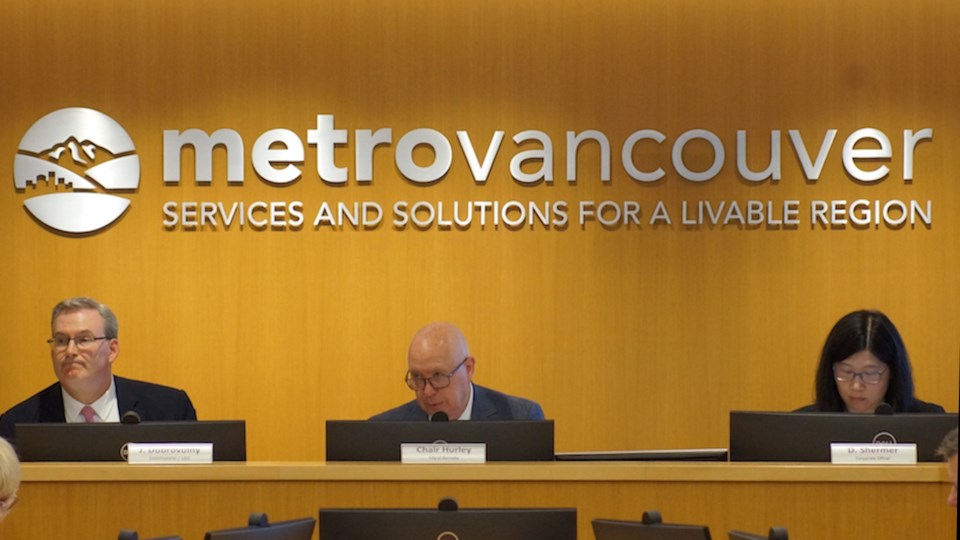The base salary for the Metro Vancouver Regional District’s top bureaucrat jumped nearly 20 per cent between 2023 and 2024.
Chief administrative officer Jerry Dobrovolny earned $540,007 last year — up 19.5 per cent from the year prior — and was buoyed by $27,133 of “performance pay,” according to recently released statutory financial reports.
Dobrovolny’s salary hike came the same year Metro Vancouver’s board of directors approved an average 25.3 per cent increase to its portion of homeowners’ property tax bills, largely on account of a nearly $3-billion cost overrun for the North Shore Wastewater Treatment Plant that was revealed in March 2024.
Dobrovolny was compensated $451,929 in 2023 and was also paid $222,578 in unspecified “taxable benefits.” He submitted $61,615 in expenses that year.
Dobrovolny, who previously served as the City of Vancouver’s general manager of engineering services, incurred $25,276 in other taxable benefits in 2024. This brought his total remuneration to $592,416, plus $37,141 in expenses.
Meanwhile, local government-elected board members were collectively paid $1.61 million in remuneration in 2024, slightly lower than the $1.62 million in 2023, largely due to fewer board meetings being held in 2024, according to the 2024 Statement of Financial Information document to be tabled at the June 27 board meeting.
Metro Vancouver expenses have come under increased scrutiny amid accusations of “mismanagement” of the wastewater treatment plant, which is the subject of litigation between Metro Vancouver and Acciona Wastewater Solutions.
In an email to BIV, Metro Vancouver's media relations department pointed to inflation, and construction and design repairs following the termination of the Acciona contract as among the factors contributing to the ballooning costs.
The board hired consulting firm Deloitte Canada last February to assess its own remuneration level, purportedly at arm’s length.
While Deloitte found a “culture of heightened mistrust and frustration” building in the organization, the firm concluded compensation to be at adequate levels.
Deloitte judged Dobrovolny’s CAO salary to be commensurate with levels at similar organizations such as BC Hydro, TransLink, BC Ferries and ICBC.
On June 27 the board plans to deliberate on a remuneration bylaw change that will eliminate double meeting fees for meetings that last longer than four hours and eliminate remuneration for travelling on Metro Vancouver business. The former will save an estimated $67,650, whereas the latter could save $212,021.
BIV reached out to New Westminster Coun. Daniel Fontaine, who has previously called for a forensic audit of the plant and greater cost controls overall at Metro Vancouver, for comment on the latest financial figures:
“When you see incredible year-over-year increases for leadership salaries … it is beyond egregious, to be frank,” he said, adding that current proposed changes to board compensation amount to “tinkering around the edges.”
Fontaine likened Metro Vancouver top-level salaries to that of health authorities that have come under scrutiny and are subject to an ongoing provincial government review.
“A year later and not much significant has changed. On the positive side there is a lot more discussion at the board level,” added Fontaine.
BIV also reached out to board chair Mike Hurley for comment. He said Dobrovolny’s salary was set by a consultant who looked at comparable organizations in the province.
“It’s typical and you have to be competitive in the field if you want to attract that type of person,” said Hurley, noting the wastewater plant fiasco did not start under Dobrovolny’s watch beginning in November 2019.
As for Fontaine’s concerns about board remuneration, Hurley said: “You can’t take a number out of the sky and throw it out there. It has to be based on facts. Deloitte, I think, they did a very good job … it’s certainly not tinkering around the edges.”
Hurley also noted that performance bonuses have since been eliminated for the CAO position.
For 2025 Metro Vancouver has set an operating budget of $1.46 billion.
Metro Vancouver reported it paid $218.9 million in base remuneration to all its employees in 2024, up from $193 million in 2023.
In 2024, based on the collective agreements with Metro Vancouver’s two unions, employees received a four-per-cent wage increase, the report stated.
And total payments to suppliers were $1.87 billion in 2024, up 20 per cent from 2023 “largely driven by a planned increase in capital expenditures,” the report also noted.
The financial report is contained within the June 27 board agenda.




